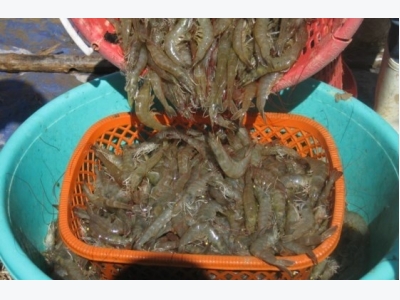Dong Thap wants no white-leg shrimp farming in freshwater areas

Dong Thap province wants breeding of white-leg shrimp in inland areas curtailed since the saltwater from these farms harm the environment (Source: sggp)
Dong Thap (VNA) - The People’s Committee of Dong Thap province has directed relevant agencies and district authorities to ensure farming of white-leg shrimps in freshwater areas is not expanded since the saltwater discharged by these farms affect water bodies and crops.
White leg shrimp was traditionally farmed in the sea, but in the last three years many inland farmers, seeing the crustacean offers good profits, have exploited groundwater and added salt to it to farm it.
Some households earn a profit of 50,000-80,000 VND per kilogramme, persuading many others to follow suit.
But the farms discharge their salinised water into the environment, causing authorities to worry about its effect on rice cultivation and farming of freshwater species.
Besides, white-leg shrimps are vulnerable to diseases, and the larger the area in which they are farmed, the higher the risk of disease outbreaks.
According to the Government’s master plan for the fishery industry until 2020, Dong Thap is not in the list of localities zoned off for white-leg shrimp breeding.
Though authorities have urged farmers not to breed white-leg shrimps in freshwater areas, the creatures are being farmed on around 150ha in Tam Nong district.
Chau Hong Phuc, deputy chairman of the province People’s Committee, said his administration has instructed the Department of Natural Resources and Environment and other agencies to intensify checks and get tough on violations related to exploiting groundwater to farm the shrimps and instruct breeders to only discharge treated wastewater into the environment.
It has also assigned them to analyse and assess production and profit, and the impacts on the environment and other agricultural production in Tam Nong district.
The local Department of Science and Technology will study the breeding of white-leg shrimps in freshwater areas to assess the adaptability and short- and long-term impacts on agricultural production, the eco-system and bio-diversity.
The administration has also ordered relevant agencies to step up inspection to prevent farmers from expanding the farming areas and urge them to stop farming the shrimps by educating them on the adverse effects.
Có thể bạn quan tâm
 Vietnamese shrimp again welcome in Australia, but…
Vietnamese shrimp again welcome in Australia, but… Australia has lifted the ban it imposed in January on the import of uncooked Vietnamese shrimp products.
 Testing dietary potassium diformate in Pacific white shrimp
Testing dietary potassium diformate in Pacific white shrimp Intensive production of the Pacific or whiteleg shrimp (Litopenaeus vannamei) in Central America and Southeast Asia is estimated at over 3 million metric tons
 Biosecurity protocols needed for shrimp feeds, feeding practices
Biosecurity protocols needed for shrimp feeds, feeding practices The cultured shrimp sector is one of the most profitable in the global aquaculture industry. In 2014, farmed shrimp – at $23.58 billion – was the second-most